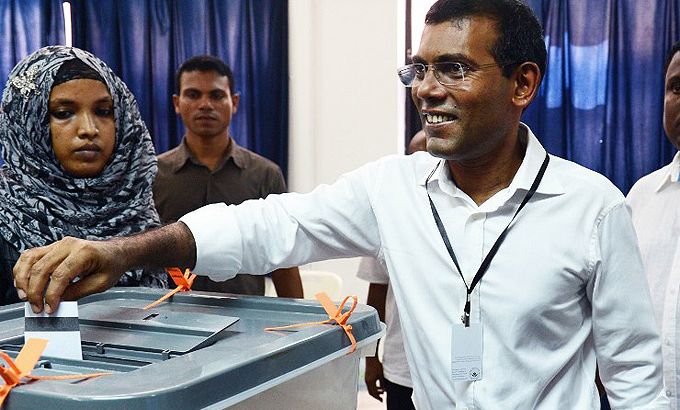Maldives presidential poll heads to runoff
Ex-President Nasheed will face run-off poll on September 28 after failing to secure more than 50 percent of votes.

The first democratically elected president of the Maldives, who was ousted from power last year, faces a runoff after falling short of a clear majority in the first round of Indian Ocean archipelago’s presidential election.
The Elections Commission announced on Sunday that former President Mohamed Nasheed had received 45 percent of the vote in Saturday’s election contested by four candidates.
He faces a September 28 runoff against Yaamin Abdul Qayyoom, a brother of Maldives’ former autocrat Maumoon Abdul Gayoom, who received 25 percent.
Nasheed needed to receive more than 50 percent of the vote to avoid a runoff. Businessman Qasim Ibrahim was a close third with 24 percent, while incumbent President Mohamed Waheed Hassan was the biggest loser with five percent.
Nasheed, who won the country’s first multiparty election in 2008, ending 30 years of autocracy, resigned last year after weeks of public protests and slipping support from the military and police.
He later said he was forced to resign at gunpoint by mutinying security forces and politicians backed by the country’s former autocrat.
Though a domestic commission of inquiry dismissed Nasheed’s claim, the country known for its luxurious beach resorts, has been in political turmoil ever since.
Nasheed has repeatedly dismissed as illegal the government of his former vice president – current President Hassan.
Nasheed wanted to win the first-round vote because of worries he could face a possible alliance among the other three opponents in the second round.
Return to democracy
Maldivians came out in force, forming long queues outside polling booths during a day of voting that appeared to have passed off without major incident under bright sunshine.
About 240,000 of the Maldives’ 350,000 citizens were eligible to vote on Saturday, and more than 211,000 voted, hoping to end the political instability and answer questions about their government’s legitimacy.
“The ruling government came (to power) not in a very good manner,” Ahmed Ilyas, a 37-year-old port employee, said after voting. “Hopefully, after the election the international community and the locals will fully cooperate with the government.”
Leela Ahmed, a 43-year-old teacher, told AFP outside a polling station in Male on Saturday that she had voted for Nasheed to reverse what she called a “coup” last year.
Regional power India and UN Secretary General Ban Ki-moon had called for free and fair elections to end a year and a half of political turmoil on the tropical islands.
Voting took place on all major inhabited islands as well as at the tourist resorts that have made the country famous worldwide.
Whoever wins the second round will need to build public confidence in government institutions that are accused of political bias, such as the courts, police and military.
The next government will have to deal with pressing issues, including high unemployment, increasing drug addiction among young people and improving transportation among the nation’s far-off islands in the Indian Ocean.
Nasheed’s fall from power last year came after he ordered the military to arrest a senior judge whom he accused of bias.
|
|
| Al Jazeera talks to the incumbent president |
Waheed, who was then vice-president, took the oath of office immediately afterwards, leading Nasheed to accuse him of taking part in a conspiracy with Gayoom and other wealthy businessmen.
Waheed denies the charges, but the contested change in leadership and subsequent violence set back what was a flourishing democracy and left a legacy of bitterness and distrust.
Nearly one million holidaymakers visited the Maldives last year, drawn to its secluded beaches on private coral-fringed islands where cabins can cost several thousand dollars a night.
Nasheed’s social programmes, eye for a political stunt and and international work to highlight climate change earned him many fans while in office, but he was not universally popular.
After growing frustrated with the judiciary, he sent the army to arrest the head of the country’s criminal court, which led to a pending criminal charge that he abused his powers while in office.
His work to increase taxes and introduce budget guesthouses also earned him enemies among the powerful tourist tycoons, while he is seen by some as being too eager to please neighbouring India.